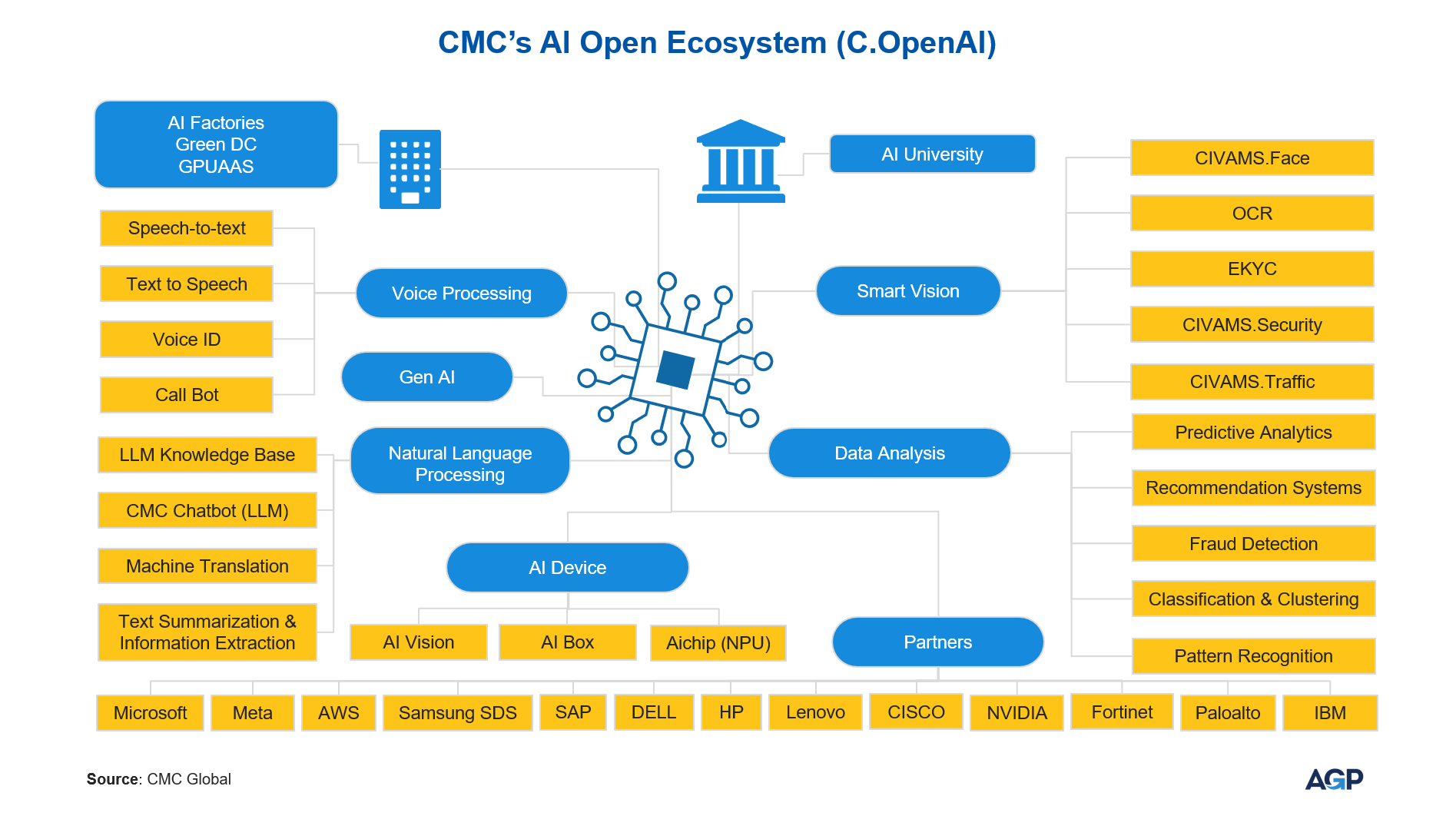Vietnam’s Vision: Building the World’s First AI-Powered City
Vietnam is making ambitious moves to position itself as a leader in artificial intelligence (AI) by transforming Ho Chi Minh City into the world’s first AI-powered city by 2030.
This initiative, unveiled at the World Economic Forum (WEF) in Davos earlier in 2025, is more than just a technological endeavor—it represents a strategic vision to redefine urban development, foster economic growth, and place Vietnam at the forefront of global innovation.
Led by CMC Corporation in collaboration with the Vietnam Center for the Fourth Industrial Revolution (C4IR), the project aims to integrate cutting-edge AI technologies across urban management, public services, and governance.
But what does it take to build an AI city? And what are the broader implications for Vietnam and the global tech landscape?
Blueprint for an AI City: Technology Meets Urban Innovation
At the heart of this initiative lies CMC Corporation’s C.OpenAI ecosystem, which integrates advanced technologies such as large language models (LLMs), computer vision, and data lakehouse architectures.
With $42 million already invested and an additional $200 million earmarked by 2030, this ecosystem will serve as the backbone for a wide range of applications.

Key Features
Smart Urban Management: AI-powered tools will optimize traffic systems, predict healthcare needs, and streamline public services. For instance, predictive analytics could help hospitals allocate resources more efficiently in response to disease outbreaks.
AI-Driven Governance: Virtual assistants and decision-support systems will enhance public administration by automating routine tasks and improving citizen engagement.
Global Collaboration: Partnerships with international tech giants like Google, SAP, and KPMG aim to bring global expertise into local development efforts.
The initiative goes beyond the adoption of advanced technologies, aiming to establish a practical framework for urban innovation that could serve as a reference point for cities globally
Talent Development: Building Vietnam’s AI Workforce
One of the most critical components of this project is talent development. To support its ambitious goals, Vietnam plans to establish an AI Center of Excellence in Ho Chi Minh City. This center will focus on training 500 high-quality engineers specializing in AI and semiconductor technologies by 2030.
Despite its rapid digital transformation, Vietnam faces a significant shortage of skilled professionals in AI-related fields. The government is tackling this challenge through:
Educational Reforms: Collaborating with universities to introduce specialized AI curricula.
Upskilling Programs: Offering training programs for workers transitioning from traditional industries to tech-focused roles.
International Partnerships: Attracting global talent through collaborations with leading research institutions and tech firms.
Developing an AI-powered urban center is not just about modernizing Ho Chi Minh City—it’s a move to secure Vietnam’s foothold in the global technology race, ensuring the country can compete with leading innovation hubs while fostering local expertise.

Challenges on the Road to Becoming an AI City
Vietnam’s vision comes with its share of challenges. These must be addressed to ensure the project’s success and sustainability.
Energy Demands: AI applications require immense computational power, which places significant pressure on energy infrastructure. Vietnam is exploring renewable energy solutions such as solar power and energy storage technologies to meet these demands sustainably.
Ethical Considerations: As AI becomes more integrated into daily life, issues such as data privacy, algorithmic bias, and transparency must be addressed. Robust governance frameworks will be essential to ensure ethical AI deployment.
Infrastructure Gaps: High-performance computing capabilities and reliable cloud infrastructure are critical for managing AI workloads. Investments in scalable storage solutions and robust internet connectivity will be necessary.
A Model for Urban Development
Vietnam’s initiative aligns with a broader movement across Southeast Asia, where nations are increasingly turning to artificial intelligence as a means of driving economic growth. What distinguishes Vietnam’s approach is its emphasis on integrating technological advancements with solutions aimed at addressing societal challenges.
The successful implementation of this initiative could significantly boost Vietnam’s economy by attracting foreign investment, fostering innovation, and creating high-value jobs. It also positions Vietnam as a leader in the global AI landscape.
Southeast Asia is emerging as a hub for AI innovation, with countries like Singapore and Indonesia making significant strides. Vietnam’s project stands out due to its focus on integrating AI into urban management and governance.
Dr. Philipp Rösler, former Vice Chancellor of Germany and Honorary Director of C4IR Vietnam, emphasized during the WEF forum that “Vietnam is not just adopting AI; it is shaping its future.” His involvement underscores the importance of international collaboration in realizing this vision.
Lessons for Other Cities
Vietnam’s journey offers valuable lessons for other cities looking to integrate AI into their urban ecosystems:
- Focus on Talent Development: Investing in education and upskilling programs is critical.
- Address Ethical Concerns Early: Establishing clear governance frameworks can prevent issues related to data privacy and algorithmic bias.
- Collaborate Globally: Partnerships with international organizations can bring expertise and resources that accelerate progress.
Final Thoughts
Vietnam’s plan to build the world’s first AI-powered city highlights its growing role in the global tech ecosystem. While challenges such as energy demands, talent shortages, and ethical concerns remain, the country’s proactive approach offers hope for overcoming these obstacles.
If executed effectively, this initiative could redefine urban development—not just for Vietnam but for cities worldwide navigating the complexities of integrating AI into daily life.
Related Insights.











